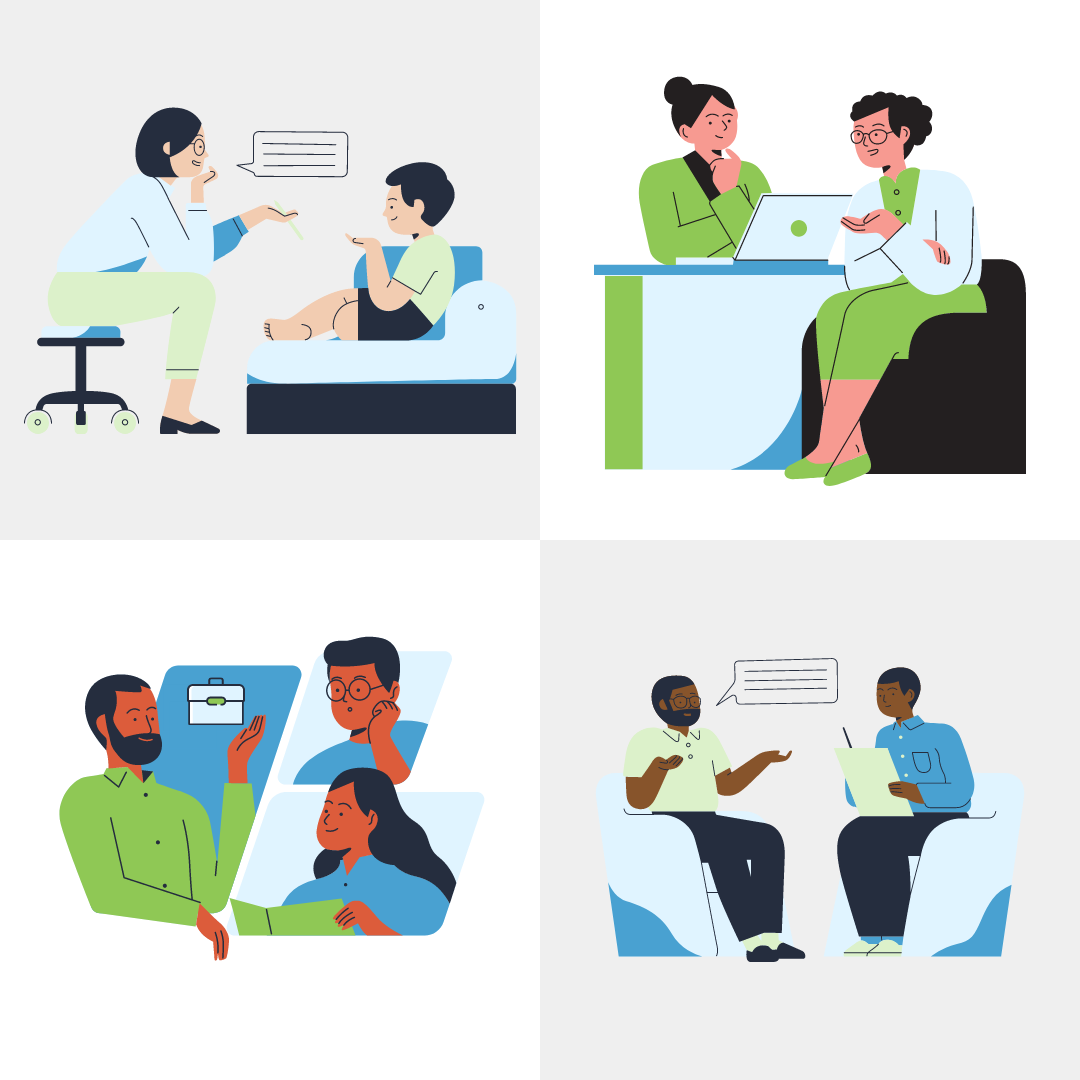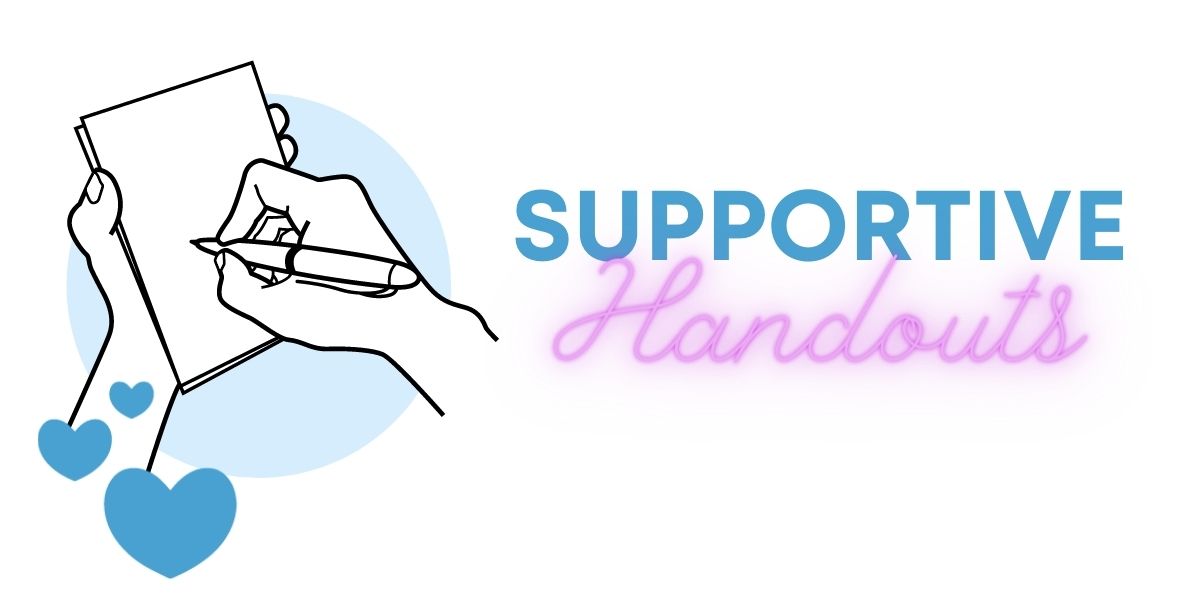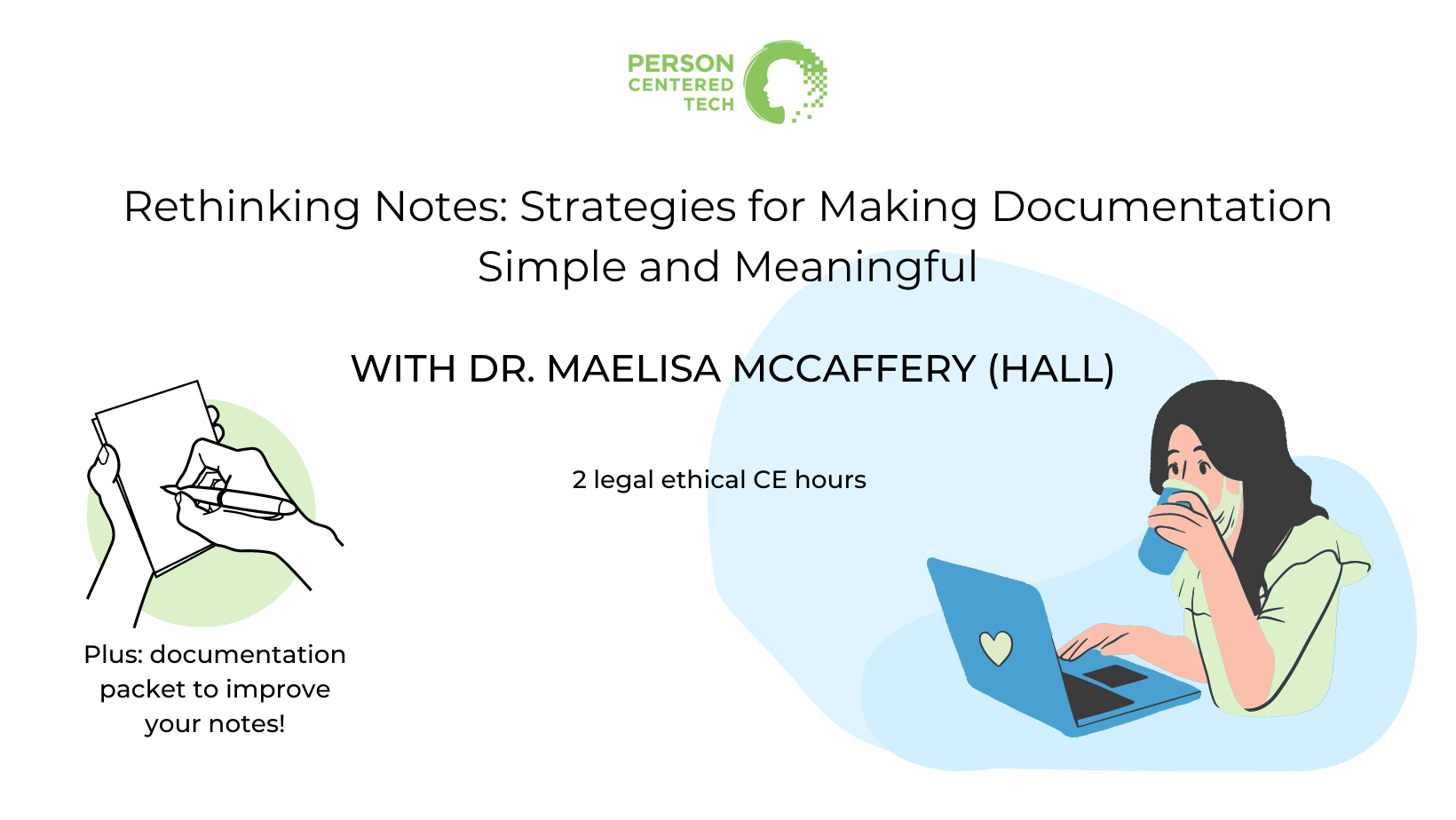2 CE Credit Hour Presentation on Documentation and Clinical Notes
Rethinking Notes: Strategies for Making Documentation Simple and Meaningful
Join Dr. Maelisa McCaffery (Hall) as she teaches how to make documentation a stress-free process in any clinical setting.
Plus: Dr. McCaffery (Hall)’s documentation packet to help you improve your notes
2 legal ethical CE credit hours
On Demand Self Study
Do Notes Stress You Out?
Few psychotherapists receive training in documentation during internship and graduate school. This leads many licensed clinicians to learn on their own and through experience.
In this presentation, you’ll learn the most common mistakes that psychotherapists make with their documentation and what leads to these mistakes. Most importantly though, you’ll learn what to do instead and how to make documentation a stress-free process in any clinical setting
Real feedback from the live event:
“The training was great –I was looking for ideas to be more expedient and succinct with my notes and thought the guidance was very helpful.”
“the training was one of the best ones on documentation I’ve been to”
“The quality of PCT’s trainings has been excellent!”
“Thank you for being! You guys make my life better!”
Who is this event for?
This course is designed for solo practitioners, group practice leaders, and group practice clinical staff members. It is also suitable for practices that consist of 100% in-person, 100% telehealth, or a mixture of in-person and telehealth treatment.
 In-person Practices
In-person Practices
 Hybrid Practices
Hybrid Practices
 Teletherapy Only Practices
Teletherapy Only Practices


Plus a Documentation Pack to Improve Your Notes:
- Therapy interventions list
- Progress notes checklist
- Sample progress notes
- Note writing prompts
I’ve been watching several of your CE programs and, while I’ve always been impressed with your services, I just have to say, your programs are excellently done with production and content and simultaneously warm and accessible. I really appreciate what you do!
Create High Quality Notes in Less Time, Without Negatively Impacting Clinical Quality
Identify the most common mistakes in documentation and discover strategies for creating high quality notes
Regulatory Requirements
Define client’s access to records based on HIPAA, OpenNotes, and other applicable
laws and ethics
Tips for Tricky Situations
Describe how to document high risk issues, outside of session communication, and
notes for special populations (couples, family, etc.)
Training is Step 2 of the PCT Way.

Course Details
2 CE Credit Hour. Self Study
Title: Rethinking Notes: Strategies for Making Documentation Simple and Meaningful
Authors/Presenters: Maelisa Hall, PsyD
CE Length: 2 CE credit hours, legal-ethical
Legal-Ethical CE Hours: 2 legal-ethical CE hour
Educational Objectives:
- Identify the most common mistakes in documentation
- Describe at least 3 strategies for creating high quality notes
- Define client’s access to records based on HIPAA, OpenNotes, and other applicable laws and ethics
- Explain how to save time on notes without negatively impacting clinical quality
- Describe how to document high risk issues, outside of session communication, and notes for special populations (couples, family, etc.)
Syllabus:
- Introductions
● Common mistakes in documentation
○ Writing too much
○ Writing too little
○ Over focusing on insurance
○ Forgetting to include insurance requirements
● Strategies for high quality notes
○ Using a personalized and consistent template
○ Considering the clinical meaning for all the potential readers
○ Writing in a timely manner
○ Communication outside of sessions
● Strategies for saving time on notes
○ Including other documentation with your notes
○ Including your client in the process
● Client access to records
○ HIPAA
○ OpenNotes
○ Collaborative documentation
● Documenting high risk issues and for specialty populations
○ High risk issues
○ Couples and families
○ Children and adolescents
● Q&A, Closing Comment
Note: Yes! Medical necessity will be addressed in this presentation.
Meet Our Presenters
Presented by
Maelisa McCaffery (Hall), PsyD

Dr. Maelisa McCaffery (Hall) is a licensed psychologist, nail design enthusiast, and multi-passionate entrepreneur. With her business QA Prep, she empowers therapists through trainings and consultation on clinical documentation. Maelisa focuses on the “why” behind the usual
recommendations and encourages clinicians to think outside the box, while also keeping their ethics intact. A true ENFP, Maelisa aims to make sure all of her endeavors are meeting a need in the community while also allowing for plenty of laughter and fun.
Resources & Citations
● American Psychological Association. (2017). Ethical principles of psychologists and code
of conduct. Washington, DC: Author.
● American Psychological Association. (2009). Criteria for the Evaluation of Quality
Improvement Programs and the Use of Quality Improvement Data. American
Psychologist. September Vol 64 Number 6, Pages 551-557.
● Griswold, G. (2015) Navigating the Insurance Maze. San Jose, CA: Paper Street Press.
● Luepker, E.T. (2012) Record Keeping in Psychotherapy and Counseling. New York, NY:
Routledge, Taylor and Francis Group.
● Schwitzer, A.M. & Rubin, L.C. (2015) Diagnosis & Treatment Planning Skills. Thousand
Oaks, CA: SAGE Publishing.
● Sutton, R. (2016) The Counselor’s STEPs for Progress Notes. San Bernardino, CA: Self
Published.
● US Dept. of Health and Human Services. (2006). HIPAA Administrative Simplification .
Washington, DC: Author.
● US Dept. of Health and Human Services. (2013). HIPAA Omnibus Final Rule .
Washington, DC: Author.
● Wiger, D.E. (2012) The Psychotherapy Documentation Primer, 3rd Edition. Hoboken, NJ:
John Wiley & Sons, Inc.
● Zuckerman, E.L. and Kolmes, K. (2017) The Paper Office for the Digital Age. New York,
NY: The Guilford Press.
Conflicts of Interest: Dr. Hall is the CEO of QA Prep, an organization which provides additional resources and consultation on clinical documentation for mental health professionals, which may be mentioned as an optional resource for learners.
Commercial Support: none.
